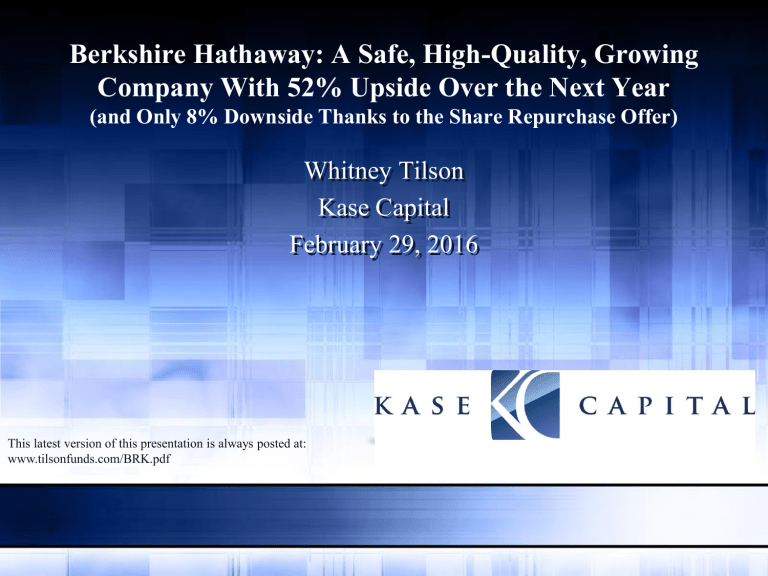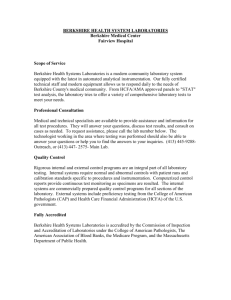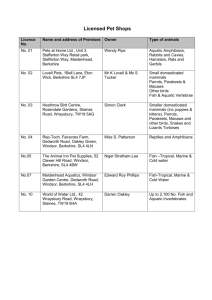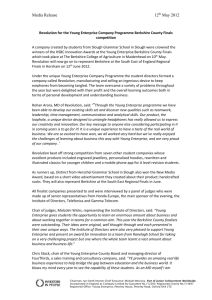Berkshire Hathaway
advertisement

Berkshire Hathaway: A Safe, High-Quality, Growing Company With 52% Upside Over the Next Year (and Only 8% Downside Thanks to the Share Repurchase Offer) Whitney Tilson Kase Capital February 29, 2016 This latest version of this presentation is always posted at: www.tilsonfunds.com/BRK.pdf Kase Capital Management Manages Three Hedge Funds and is a Registered Investment Advisor Carnegie Hall Tower 152 West 57th Street, 46th Floor New York, NY 10019 (212) 277-5606 WTilson@KaseCapital.com Disclaimer THIS PRESENTATION IS FOR INFORMATIONAL AND EDUCATIONAL PURPOSES ONLY AND SHALL NOT BE CONSTRUED TO CONSTITUTE INVESTMENT ADVICE. NOTHING CONTAINED HEREIN SHALL CONSTITUTE A SOLICITATION, RECOMMENDATION OR ENDORSEMENT TO BUY OR SELL ANY SECURITY OR OTHER FINANCIAL INSTRUMENT. INVESTMENT FUNDS MANAGED BY WHITNEY TILSON OWN SHARES IN BERKSHIRE HATHAWAY. HE HAS NO OBLIGATION TO UPDATE THE INFORMATION CONTAINED HEREIN AND MAY MAKE INVESTMENT DECISIONS THAT ARE INCONSISTENT WITH THE VIEWS EXPRESSED IN THIS PRESENTATION. WE MAKE NO REPRESENTATION OR WARRANTIES AS TO THE ACCURACY, COMPLETENESS OR TIMELINESS OF THE INFORMATION, TEXT, GRAPHICS OR OTHER ITEMS CONTAINED IN THIS PRESENTATION. WE EXPRESSLY DISCLAIM ALL LIABILITY FOR ERRORS OR OMISSIONS IN, OR THE MISUSE OR MISINTERPRETATION OF, ANY INFORMATION CONTAINED IN THIS PRESENTATION. PAST PERFORMANCE IS NO GUARANTEE OF FUTURE RESULTS AND FUTURE RETURNS ARE NOT GUARANTEED. -3- The Basics • Stock price (2/29/16): $202,555 – $134.17 for B shares • Shares outstanding: 1.64 million • Market cap: $333 billion • Total assets (Q4 '15): $552 billion • Total equity (Q4 '15): $259 billion • Book value per share (Q4 '15): $155,501 • Repurchase maximum price (1.2x book): $186,601 • Downside to the Buffett repurchase put: 8% • P/B: 1.30x • Float (Q4 '15): $88 billion • Revenue: $211 billion • Berkshire Hathaway today is the 15th largest company in the world (and 4th largest in the U.S.) by revenues -4- History History • Berkshire Hathaway today does not resemble the company that Buffett bought into during the 1960s • It was a leading New England-based textile company, with investment appeal as a classic Ben Graham-style "net-net" • Buffett took control of Berkshire on May 10, 1965 • At that time, the company had a market value of about $18 million and shareholder's equity of about $22 million -5- The Berkshire Hathaway Empire Today Stakes in Public Companies Worth ~$1B+ Company Shares Price Value ($B) Kraft Heinz 325.6 $77.84 $25.3 Wells Fargo 500.0 $48.07 $24.0 Coca-Cola 400.0 $43.14 $17.3 81.0 $132.03 $10.7 151.6 $55.38 $8.4 Phillips 66 61.5 $79.10 $4.9 Procter & Gamble 52.8 $81.10 $4.3 Munich RE 20.1 $198.16 $4.0 700.0 $12.70 $3.9 Wal-Mart 56.2 $66.51 $3.7 U.S. Bancorp 85.1 $39.29 $3.3 DaVita 38.6 $66.46 $2.6 Moody's 24.7 $88.60 $2.2 Charter Comm. 10.3 $181.21 $1.9 Deere 22.9 $79.47 $1.8 Sanofi 22.2 $80.33 $1.8 AT&T 46.6 $37.13 $1.7 Goldman Sachs 11.0 $150.25 $1.6 GM 50.0 $29.63 $1.5 Verisign 13.0 $85.88 $1.1 IBM American Express Bank of America Note: Shares as of 2/16/16 13-F; Stock prices as of 2/26/16. Excludes holdings (if any) in POSCO and BYD. BofA net of $5B. -6- Berkshire's Culture Is Powerful and Unique: "A Seamless Web of Deserved Trust" • Berkshire operates via extreme decentralization: though it is one of the largest businesses in the world with approximately 340,000 employees, only 25 of them are at headquarters in Omaha – • • • • There is no general counsel or human resources department "By the standards of the rest of the world, we overtrust. So far it has worked very well for us. Some would see it as weakness." – Charlie Munger, 5/14 "A lot of people think if you just had more process and more compliance — checks and double-checks and so forth — you could create a better result in the world. Well, Berkshire has had practically no process. We had hardly any internal auditing until they forced it on us. We just try to operate in a seamless web of deserved trust and be careful whom we trust." – Munger, 5/07 "We will have a problem of some sort at some time…300,000 people are not all going to behave properly all the time." – Warren Buffett, 5/14 "Behavioral scientists and psychologists have long contended that 'trust' is, to some degree, one of the most powerful forces within organizations. Mr. Munger and Mr. Buffett argue that with the right basic controls, finding trustworthy managers and giving them an enormous amount of leeway creates more value than if they are forced to constantly look over their shoulders at human resources departments and lawyers monitoring their every move." – NY Times, 5/5/14 -7- Earnings of Non-Insurance Businesses Have Soared Earnings before taxes* Insurance Group: GEICO General Re Berkshire Reinsurance Group Berkshire H. Primary Group Investment Income Total Insurance Oper. Inc. 2004 2005 2006 2007 2008 2009 2010 2011 2012 2013 2014 2015 970 3 417 161 2,824 4,375 1,221 -334 -1,069 235 3,480 3,533 1,314 526 1,658 340 4,316 8,154 1,113 555 1,427 279 4,758 8,132 916 342 1,222 210 4,896 7,586 649 477 250 84 5,459 6,919 1,117 452 176 268 5,145 7,158 576 144 -714 242 4,725 4,973 680 355 304 286 4,454 6,079 1,127 283 1,294 385 4,713 7,802 1,159 277 606 626 4,357 7,025 460 132 421 824 4,550 6,387 2,963 276 733 3,014 771 7,757 1,528 344 686 1,028 653 4,239 3,611 1,539 369 813 3,092 689 10,113 4,741 1,659 370 992 3,675 774 12,211 5,377 1,644 403 3,911 1,272 1,393 14,000 5,928 1,806 486 4,205 1,469 1,564 15,458 6,169 2,711 435 4,811 1,546 1,839 17,511 6,775 2,851 502 4,893 1,720 2,086 18,827 15,343 11,158 17,271 17,184 20,079 23,260 24,536 25,214 Non-Insurance Businesses:** Burlington Northern Santa Fe Berkshire Hathaway Energy McLane Company Manufacturing Service & Retailing Finance and financial products Total Non-Insur. Oper. Inc. 466 228 485 217 1,476 229 1,787 584 3,065 1,921 822 3,445 3,297 1,157 6,159 1,774 232 436 3,279 1,006 6,727 Total Operating Income 7,440 6,978 14,313 14,859 * In 2010, Berkshire changed this table from "Earnings before income taxes, noncontrolling interests and equity method earnings" to "Earnings before income taxes". ** Non-insurance businesses were recategorized in 2014, so figures prior to 2012 are not comparable. -8- Berkshire Is Becoming Less of an Investment Company and More of an Operating Business * Source: 2010 annual letter. -9- Buffett Continues to Put Berkshire's Cash to Work at a Healthy Clip $20 Heinz ($12.3B) Burlington Northern (total value of the company at acquisition was $34B) BofA ($5B) $15 $B ISCAR & PacifiCorp PCP ($32B) Lubrizol $10 $5 $0 1997 1998 1999 2000 2001 2002 2003 2004 2005 2006 2007 2008 2009 2010 2011 2012 2013 2014 2015 -$5 Acquisitions • • Net Stock Purchases Buffett is doing a good job investing – the latest examples being Precision Castparts and Kraft – but the cash is coming in so fast (a high-class problem)! – Berkshire will generate free cash flow equal to the $32 billion paid for PCP in ~2 years Markets have a way of presenting big opportunities on short notice – Junk bonds in 2002, chaos in 2008 – Buffett has reduced the average maturity of Berkshire’s bond portfolio so he can act quickly -10- Buffett Invested Large Amounts of Capital During the Downturn in 2008 Investment/Commitment Amount (Bn) Comment Mars/Wrigley $6.5 Auction rate securities $6.5 Q2 event; sold much in Q3 Goldman Sachs $5.0 Plus $5B to exercise warrants Constellation Energy stock and preferred $5.7 Sold for a $1.1B gain incl. breakup fee Marmon $4.5 The remaining 34.6% not owned by BRK was purchased from 2011-14 General stock purchases $3.3 Full year; net of sales Dow/Rohm & Haas $3.0 General Electric $3.0 Plus $3B to exercise warrants Fed. Home Loan Disc. Notes $2.4 Q2 event; sold much in Q3 Tungaloy $1.0 Iscar acquisition Swiss Re unit $0.8 Plus sharing agreement ING reinsurance unit $0.4 Other businesses purchased $3.9 TOTAL $46.0 Plus $8B to exercise GS & GE warrants Note: Does not include capital committed to Berkshire's bond insurance business, Berkshire Assurance -11- Valuing Berkshire "Over the years we've…attempt[ed] to increase our marketable investments in wonderful businesses, while simultaneously trying to buy similar businesses in their entirety." – 1995 Annual Letter "In our last two annual reports, we furnished you a table that Charlie and I believe is central to estimating Berkshire's intrinsic value. In the updated version of that table, which follows, we trace our two key components of value. The first column lists our per-share ownership of investments (including cash and equivalents) and the second column shows our per-share earnings from Berkshire's operating businesses before taxes and purchase-accounting adjustments, but after all interest and corporate expenses. The second column excludes all dividends, interest and capital gains that we realized from the investments presented in the first column." – 1997 Annual Letter "In effect, the columns show what Berkshire would look like were it split into two parts, with one entity holding our investments and the other operating all of our businesses and bearing all corporate costs." – 1997 Annual Letter -12- Buffett's Comments on Berkshire's Valuation Lead to an Implied Historical Multiplier of ~12x Pre-tax EPS Excluding All Year-End Investments Income From Stock Intrinsic Implied Year Per Share Investments Price Value Multiplier 1996 $28,500 $421 $34,100 $34,100 13 1997 $38,043 $718 $46,000 $46,000 11 1998 $47,647 $474 $70,000 $54,000 13 1999 $47,339 -$458 $56,100 $60,000 • • • • 1996 Annual Letter: "Today's price/value relationship is both much different from what it was a year ago and, as Charlie and I see it, more appropriate." 1997 Annual Letter: "Berkshire's intrinsic value grew at nearly the same pace as book value" (book +34.1%) 1998 Annual Letter: "Though Berkshire's intrinsic value grew very substantially in 1998, the gain fell well short of the 48.3% recorded for book value." (Assume a 1520% increase in intrinsic value.) 1999 Annual Letter: "A repurchase of, say, 2% of a company's shares at a 25% discount from per-share intrinsic value...We will not repurchase shares unless we believe Berkshire stock is selling well below intrinsic value, conservatively calculated...Recently, when the A shares fell below $45,000, we considered making repurchases." -13- Estimating Berkshire's Value: 2001 – 2015 Investments Year End Per Share 2001 $47,460 2002 $52,507 2003 $62,273 2004 $66,967 2005 $74,129 2006 $80,636 2007 $90,343 2008 $75,912 2009 $91,091 2010 $94,730 2011 $98,366 2012 $113,786 2013 $129,253 2014 $140,123 2015 $159,794 Pre-tax EPS Excluding All Income From Intrinsic Value Investments1 Per Share2 -$1,289 $64,000 $1,479 $70,255 $2,912 $97,217 $3,003 $103,003 $3,600 $117,329 $5,300 $144,236 $5,600 $157,543 $5,727 $121,728 $3,571 $119,659 $7,200 $152,330 $8,000 $178,366 $8,700 $200,786 $9,716 $226,413 $12,051 $260,633 $12,304 $282,834 Subsequent Year Stock Price Range $59,600-$78,500 $60,600-$84,700 $81,000-$95,700 $78,800-$92,000 $85,700-$114,200 $107,200-$151,650 $84,000-$147,000 $70,050-$108,100 $97,205-$128,730 $98,952-$131,463 $114,500-$134,060 $139,610-$178,275 $163,038-$229,374 $186,900-$227,470 ? 1. Unlike Buffett, we included a conservative estimate of normalized earnings from Berkshire's insurance businesses: half of the $2 billion of average annual profit over the past 12 years, equal to $600/share prior to 2014. Starting in the 2015 AR, Buffett began to include all insurance earnings, so this is reflected in 2014 and 2015 earnings. 2. Historically we believe Buffett used a 12 multiple, but given compressed multiples during the downturn, we used an 8 in 2008-2010 and 10 since then. -14- Berkshire Is Trading 28% Below Its Intrinsic Value $283,000 Intrinsic value* * Investments per share plus 12x pre-tax earnings per share through 2007, then an 8x multiple from 2008-2010, and a 10x multiple thereafter. Excludes all i all income from investments, but including $600/share of insurance earnings -15- 12-Month Investment Return • • • • • Current intrinsic value: $283,000/share Plus 6% annual growth of intrinsic value of the business Plus $8,000/share cash build over next 12 months Equals intrinsic value in one year of $308,000 52% above today's price -16- Catalysts • • • • • Continued earnings growth of operating businesses Likelihood of meaningful acquisitions New stock investments Additional cash build Share repurchases (if the stock drops to 1.2x book or below; it’s currently at 1.3x) -17- Berkshire's Share Repurchase Program (1) • On September 26, 2011, Berkshire announced the first formal share repurchase program in Berkshire's history, and only the second time Buffett has ever offered to buy back stock • It's unusual in three ways: 1. 2. 3. There's no time limit There's no dollar cap Buffett set a price: "…no higher than a 10% premium over the thencurrent book value of the shares. In the opinion of our Board and management, the underlying businesses of Berkshire are worth considerably more than this amount…" • On December 12, 2012, Berkshire increased the limit to 1.2x book and announced that it had repurchased $1.2 billion in one transaction • Book value per share at the end of 2015 was $155,501 • Thus, a 20% premium means that Buffett is willing to buy back stock up to $186,601, 8% below the current price -18- Berkshire's Share Repurchase Program (2) • It confirms that Buffett shares our belief that Berkshire stock is undervalued – – – • He wouldn't be buying it back at a 20% premium to book value if he thought its intrinsic value was, say, 30% above book On the first page of the 2015 annual letter, he wrote “Berkshire’s intrinsic value far exceeds its book value. That’s why we would be delighted to repurchase our shares should they sell as low as 120% of book value. At that level, purchases would instantly and meaningfully increase per-share intrinsic value for Berkshire’s continuing shareholders.” Our estimate is $283,000/share or 1.82x book value Buffett put a floor on the stock: he was clear in numerous interviews after the program was announced that he is eager to buy back a lot of stock – and he has plenty of dry powder to do so: – – – Berkshire has $61.2 billion of cash (excluding railroads, utilities, energy, finance and financial products), plus another $26.0 billion in bonds (nearly all of which are short-term, cash equivalents), which totals $87.2 billion (will soon be reduced by $32B for PCP) On top of this, the company generated $15.4 billion in free cash flow in 2015 – in other words, ~$1.3 billion is pouring into Omaha every month The Sept. 2011 press release noted that "repurchases will not be made if they would reduce Berkshire's consolidated cash equivalent holdings below $20 billion," so that leaves $67 billion to deploy (and growing by $1.3 billion/month), equal to 20% of the company's current market cap • – It's unlikely, however, that Buffett would repurchase anything close to this amount, as some of the cash and bonds are held at various insurance subsidiaries, plus Buffett likely wants to keep plenty of dry powder to make acquisitions and investments In summary, even with the upcoming payment of ~$32B for PCP, Buffett could easily buy back $20 billion of stock and still have plenty of dry powder for other investments -19- Risk: Who Will Replace Buffett? • When Buffett is no longer running Berkshire, his job will be split into two parts: one CEO, who has not been named, and a small number of CIOs (Chief Investment Officers) – – • A CEO successor (and two backups) have been identified, but not publicly named Two CIOs have been named already, Todd Combs and Ted Weschler, both of whom are excellent investors Nevertheless, Buffett is irreplaceable and it will be a significant loss when he no longer runs Berkshire for a number of reasons: – – – – There is no investor with Buffett's experience, wisdom and track record, so his successors' decisions regarding the purchases of both stocks and entire businesses might not be as good Most of the 80+ managers of Berkshire's operating subsidiaries are wealthy and don't need to work, but nevertheless work extremely hard and almost never leave thanks to Buffett's "halo" and superb managerial skills. Will this remain the case under his successors? Buffett's relationships and reputation are unrivaled so he is sometimes offered deals and terms that are not offered to any other investor – and might not be offered to his successors Being offered investment opportunities (especially on terms/prices not available to anyone else) also applies to buying companies outright. There's a high degree of prestige in selling one's business to Buffett (above and beyond the advantages of selling to Berkshire). For example, the owners of Iscar could surely have gotten a higher price had they taken the business public or sold it to an LBO firm -20- Aren't We Concerned About the Uncertainty of Berkshire After Buffett? Answer: Not really, for two primary reasons: 1. Buffett isn't going anywhere anytime soon. We think it's at least 80% likely that Buffett will be running Berkshire for five more years, and perhaps 50% likely he'll be doing so for 10 more years • • • Buffett turned 85 on Aug. 30th, 2015, is in excellent health, and loves his job There are no signs that he is slowing down mentally – in fact, he appears to be getting better with age A life expectancy calculator (http://calculator.livingto100.com) shows that Buffett is likely to live to age 93 – and we'd bet on the over 2. The stock is undervalued based on our estimate of intrinsic value, which does not include any Buffett premium • • We simply take investments/share and add the value of the operating businesses, based on a conservative multiple of their normalized earnings The value of the cash and bonds won't change, and Wells Fargo, Kraft Heinz, Coke, American Express, Burlington Northern, GEICO, etc. will continue to generate robust earnings even after Buffett is no longer running Berkshire -21- Why Doesn't Buffett Identify His Successor Now? We agree with Buffett's decision not to name his successor for three reasons: 1. It would place enormous pressure and expectations on this person, which is unnecessary and counterproductive; 2. It might be demotivating for the candidates who were not chosen; and 3. Who knows what will happen between now and the time that a successor takes over (which could be more than a decade)? – – – Maybe the current designee falls ill, leaves Berkshire, performs poorly, or makes a terrible mistake (remember David Sokol?) Or what if another candidate (perhaps one of the two backup successors today) performs incredibly well, or Berkshire acquires a business with a fantastic CEO, and Buffett and the board decide that another candidate is better? By not naming Buffett’s successor now, Buffett and the board will be able to switch their choice without the second-guessing and media circus that would occur if the successor had been named -22- The Real Buffett Risk • Buffett is often asked (as are we): "What would happen to the company (and stock) if you got hit by a bus (i.e., die suddenly)?" – If it happened tomorrow, our best guess is that the stock would fall 15% (which might give Berkshire the opportunity to buy back a lot of stock) – But this isn't likely. Not to be morbid, but most people don't die suddenly from something like an accident or heart attack, but rather die slowly: their bodies (and sometimes minds) degrade gradually – A far greater risk to Berkshire shareholders is that Buffett begins to lose it mentally and starts making bad investment decisions, but doesn't recognize it (or refuses to acknowledge it because he loves his work so much) and the board won't "take away the keys", perhaps rationalizing that a diminished Buffett is still better than anyone else – Buffett is aware of this risk and has instructed Berkshire's board members, both publicly and privately, that their most important job is to "take away the keys" if they see him losing it – We trust that both Buffett and the board will act rationally, but also view it as our job to independently observe and evaluate Buffett to make sure we're comfortable that he's still at the top of his game. Today, we think he's never been better -23- An Analogy with Apple & Steve Jobs • The most comparable example of a business that, like Berkshire, is closely associated with its legendary founder and CEO is Apple – As Steve Jobs's health began to fail, he assumed fewer day-to-day responsibilities, passing them to top lieutenants – Jobs resigned as CEO on Aug. 24, 2011 and died exactly six weeks later – Apple's stock on the first trading days after his retirement and death were announced declined less than 1%, as this chart shows: First day of trading after Steve Jobs announces retirement First day of trading after Steve Jobs dies -24- Other Risks • The single biggest risk is that as Berkshire gets larger and Buffett gets older, investors value the stock at a lower and lower multiple of earnings/book value, such that even if intrinsic value continues to grow, the stock goes nowhere for an extended period • A recession impacts Berkshire's earnings and stock portfolio materially • A market decline leads to losses in shorter-duration derivatives such as credit-default swaps and/or equity index puts • A very large investment goes awry • A major super-cat event costs Berkshire many billions -25- Conclusion: Berkshire Has Everything I Look for in a Stock: It's Safe, Cheap and Growing at a Healthy Rate • Extremely safe: Berkshire's huge hoard of liquid assets, the quality and diversity of its businesses, the fact that much of its earnings (primarily insurance and utilities) aren't tied to the economic cycle, and the conservative way in which it's managed all protect Berkshire's intrinsic value, while the share repurchase program provides downside protection to the stock • Upside: trading 28% below intrinsic value (without giving any credit to immense optionality), with 52% upside over the next year • Downside: Only 8% downside to 1.2x book value, which is where Buffett it will to buy the stock, thereby putting a floor on it. • Growing: Intrinsic value is growing at roughly 6-8% annually -26-




